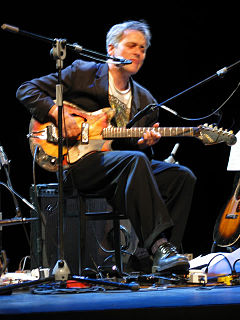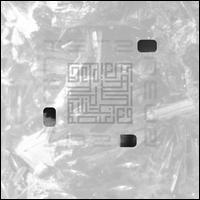
John Zorn is an American composer, conductor, saxophonist, arranger and producer who "deliberately resists category". Zorn's avant-garde and experimental approaches to composition and improvisation are inclusive of jazz, rock, hardcore, classical, contemporary, surf, metal, soundtrack, ambient, and world music. In 2013, Down Beat described Zorn as "one of our most important composers" and in 2020 Rolling Stone noted "Though Zorn has operated almost entirely outside the mainstream, he's gradually asserted himself as one of the most influential musicians of our time".

Derek Bailey was an English avant-garde guitarist and an important figure in the free improvisation movement. Bailey abandoned conventional performance techniques found in jazz, exploring atonality, noise, and whatever unusual sounds he could produce with the guitar. Much of his work was released on his own label Incus Records. In addition to solo work, Bailey collaborated frequently with other musicians and recorded with collectives such as Spontaneous Music Ensemble and Company.

Marc Ribot is an American guitarist and composer.

Masada is a musical group with rotating personnel led by American saxophonist and composer John Zorn since the early 1990s.
Death Ambient is an American experimental and ambient music trio comprising Kato Hideki, Ikue Mori, and Fred Frith (guitar). The group was formed by Hideki and Mori in 1995 and recorded three albums: Death Ambient (1995) Synaesthesia (1999), Drunken Forest (2007) with guest Jim Pugliese (percussion).

Masada Anniversary Edition Vol. 1: Masada Guitars is the first album in a series of five releases celebrating the 10th anniversary of John Zorn's Masada songbook project.

Yo! I Killed Your God is a concept album by Marc Ribot, recorded live between 1992 and 1994. It was released May 18, 1999 on Tzadik Records.

Taboo & Exile is an album by John Zorn. It is the second album to appear in Zorn's Music Romance Series following Music for Children (1998). Three of the tracks on this recording are from Zorn's Masada songbook.

Music for Children is the first release in John Zorn's Music Romance Series and features three Naked City compositions performed by Zorn with the band Prelapse; a 20-minute composition for wind machines and controlled feedback systems dedicated to Edgar Varese, and a classical chamber music piece for violin, percussion and piano performed by the Abel-Steinberg-Winant Trio framed by a poly-rhythmic etude for percussion and celeste and a lullaby for music box.

The Classic Guide to Strategy is a compilation album by John Zorn featuring his two early solo records The Classic Guide to Strategy Volume One (1983), (tracks 1-2) and the Classic Guide to Strategy Volume Two (1986), (tracks 3-8). The albums were first released on vinyl on Lumina Records in and later re-released on Tzadik Records in 1996 as a single CD. The second track is inspired by the work of Carl Stalling and tracks 3-8 are named after avant-garde Japanese artists. The Classic Guide to Strategy Volume Two also contained the track "Yano Akiko" (5:20) which does not appear on the CD re-release.

Filmworks III: 1990–1995 features the scores for film and advertisements by John Zorn. The album was originally released on the Japanese labels Evva in 1995 and Toys Factory in 1996 and subsequently re-released on Zorn's own label, Tzadik Records, in 1997. It features the music that Zorn wrote and recorded for Thieves Quartet (1993), directed by Joe Chappelle, which was performed by the group that would become Masada; nine cues for Kiriko Kubo's Music For Tsunta (1988); eleven tracks for Hollywood Hotel (1994), directed by Mei-Juin Chen; and thirty-two pieces for advertisements by Wieden & Kennedy.

Filmworks IV: S/M + More features film scores by John Zorn. The album was released in Japan on Eva Records in 1996 and on Zorn's own label, Tzadik Records, in 1997. It features the music that Zorn wrote and recorded for Maria Beatty's The Elegant Spanking, Beatty and M.M. Serra's A Lot of Fun for the Evil One, "Credits Included" written for the film of the same name directed by Jalal Toufic and "Maogai," written for a piano scene in a film by Hiroki Ryuichi.

Filmworks VI: 1996 features three scores for film by John Zorn. The album was released on Zorn's own label, Tzadik Records, in 1996. It features the music that Zorn wrote and recorded for Anton, Mailman (1996), a short film directed by Dina Waxman that was never completed due to loss of funding in its final stages, Mechanics of the Brain (1996) directed by Henry Hills and The Black Glove (1996), which was directed by, and starred, Maria Beatty.

Filmworks XII: Three Documentaries is an album containing three scores by John Zorn for documentary films released on Zorn's own label, Tzadik Records, in 2002. It features music that Zorn wrote and recorded for Homecoming (2002), a tribute documentary about the dance program at Performance Space 122 in New York by Charles Dennis, Shaolin Ulysses (2002) a film by Mei-Juin Chen and Martha Burr that follows Shaolin monks living and training in the United States, and Family Found (2002), a portrait of outsider artist Morton Bartlett which was directed by Emily Harris.

Masada Anniversary Edition Vol. 5: Masada Rock is the fifth and final album in a series of five releases celebrating the 10th anniversary of John Zorn's Masada songbook project. It features 10 Masada songs performed by Jon Madof's Rashanim trio with Shanir Ezra Blumenkranz on bass and Mathias Kunzli on drums in addition to Madof's guitar with guest appearances from Marc Ribot on two tracks. It was released in 2005 on Zorn's Tzadik Records as part of the Radical Jewish Culture Series.

Nani Nani is an album of improvised music by American composer and saxophonist/multi-instrumentalist John Zorn and Yamataka Eye. A sequel album Naninani II was released in 2004.

New Traditions in East Asian Bar Bands is an album by American composer and saxophonist/multi-instrumentalist John Zorn consisting of improvised music from paired instruments and narration in Chinese, Korean and Vietnamese. The pieces are listed individually within Zorn's game pieces and were composed in 1986, 1988 and 1990 respectively.

Filmworks XXI: Belle de Nature/Rijksmuseum features a score for film by John Zorn. The album was released on Zorn's own label, Tzadik Records, in 2008 and contains music that Zorn wrote and recorded for film director Maria Beatty's Belle de Nature (2008) and a documentary on the renovation of the Rijksmuseum Amsterdam.

Interzone is an album by American composer John Zorn developed to pay tribute to the influence of writers William S. Burroughs and Brion Gysin and released on Zorn's Tzadik label in 2010.

Enigmata is an album of John Zorn compositions performed by Marc Ribot and Trevor Dunn, conducted by Zorn. It was released by Tzadik Records in 2011.



















